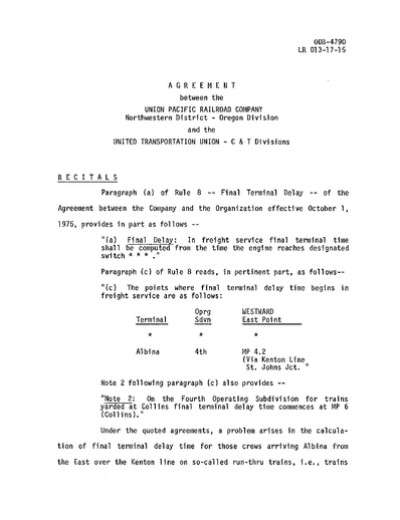FINAL DELAY-ALBINA
| Description:
LR 013-17-15
between the UNION PACIFIC RAILROAD COMPANY Northwestern District - Oregon Division and the UNITED TRANSPORTATION UNION - C & T Divisions Recitals - Paragraph (a) of Rule 8 -- Final Terminal Delay -- of the Agreement between the Company and the Organization effective October 1, 1975, provides in part as follows -- "(a) Final Delay: In freight service final terminal time shall be computed from the time the engine reaches designated switch * * * ." Paragraph (c) of Rule 8 reads, in pertinent part, as follows-- "(c) The points where final terminal delay time begins infreight service are as follows:
"Note 2: On the Fourth Operating Subdivision for trains yarded at Collins final terminal delay time commences at MP 6 (Collins). " Under the quoted agreements, a problem arises in the calculation of final terminal delay time for those crews arriving Albina from the East over the Kenton line on so-called run-thru trains, i.e., trains that operate through to Argo, and who, as a consequence, may be relieved IT IS AGREED: In the application of Rule 8, for those Fourth Subdivision crews arriving Albina over the Kenton Line and for whom final terminal delay would ordinarily commence at Mile Post 6 (Collins), final terminal delay time will commence when the train has been stopped for the express purpose of changing crews.
Example 2: Train has a meet at Champ, and makes a setout at Kenton and changes crews at Kenton. Final delay would commence when crew is relieved. Example 3: Train sets out at Kenton and then pulls down to Collins to effect crew change. Final delay would commence upon stopping at Collins. NOTE: Crews affected by this agreement will advise train dispatcher of time stopped for crew change for purpose of beginning final delay. This agreement, which is in settlement of the dispute growing out of the notice served by the Organization on August 1, 1984, shall become effective January 1, 1985 and shall remain in effect until changed or modified in accordance with the provisions of the Railway Labor Act, Dated at Portland, Oregon this 7th day of December, 1984.
L L Nelson - General Chairman UNION PACIFIC RAILROAD COMPANY: Approved -
Dear Mr. Nelson: This has reference to the agreement dated December 7, 1984 relating to final terminal delay for freight crews arriving Albina over the Kenton line, and more particularly Example 2 which reads as follows -- Example 2: Train has a meet at Champ , and makes a setout at Kenton and changes crews at Kenton . Final delay would commence when crew is relieved. It is understood that the expression, "Final delay would commence when crew is relieved," means that final del ay will commence after the work has been completed and the train has been put back together and the crew is ready for a crew change.
ACCEPTED: L L Nelson - General Chairman |
